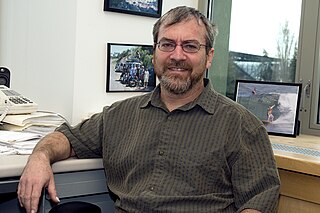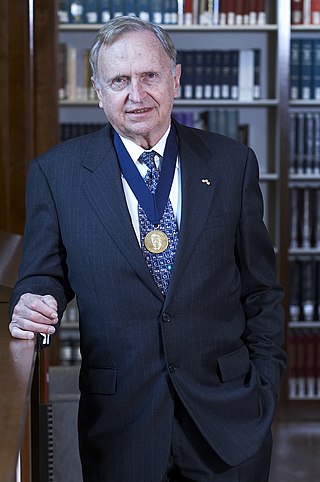Related Research Articles

Professor Michael H. Gleb is an American biochemist and chemist specializing in enzymes and particularly those of medical significance. He is the Boris and Barbara L. Weinstein Endowed Chair in Chemistry at the University of Washington in Seattle. He also teaches Honors Organic Chemistry, Chemical Biology and Enzymology.

The Perkin Medal is an award given annually by the Society of Chemical Industry to a scientist residing in America for an "innovation in applied chemistry resulting in outstanding commercial development." It is considered the highest honor given in the US chemical industry.

Ronald Charles David Breslow was an American chemist from Rahway, New Jersey. He was University Professor at Columbia University, where he was based in the Department of Chemistry and affiliated with the Departments of Biological Sciences and Pharmacology; he had also been on the faculty of its Department of Chemical Engineering. He had taught at Columbia since 1956 and was a former chair of the university's chemistry department.

Ronald T. Raines is an American chemical biologist. He is the Roger and Georges Firmenich Professor of Natural Products Chemistry at the Massachusetts Institute of Technology. He is known for using ideas and methods of physical organic chemistry to solve important problems in biology.
The Arthur C. Cope Award is a prize awarded for achievement in the field of organic chemistry research. It is sponsored by the Arthur C. Cope Fund, and has been awarded annually since 1973 by the American Chemical Society. It consists of $25,000, a medallion, and $150,000 in funding for research in organic chemistry.
The Irving Langmuir Prize in Chemical Physics is awarded annually, in even years by the American Chemical Society and in odd years by the American Physical Society. The award is meant to recognize and encourage outstanding interdisciplinary research in chemistry and physics, in the spirit of Irving Langmuir. A nominee must have made an outstanding contribution to chemical physics or physical chemistry within the 10 years preceding the year in which the award is made. The award will be granted without restriction, except that the recipient must be a resident of the United States.

Richard Bruce Silverman is the Patrick G. Ryan/Aon Professor of Chemistry at Northwestern University. His group's main focus is basic and translational research into central nervous system disorders and cancer. He is known for the discovery of pregabalin, which is marketed by Pfizer under the brand name Lyrica.

William Platt Jencks was an American biochemist. He was noted particularly for his work on enzymes, using concepts drawn from organic chemistry to understand their mechanisms.
The American Chemical Society Award in Pure Chemistry is awarded annually by the American Chemical Society (ACS) "to recognize and encourage fundamental research in pure chemistry carried out in North America by young men and women." "Young" means born within 35 years of the awarding of the Award, which takes place at the Spring meeting of the ACS. To be eligible, a nominee "must have accomplished research of unusual merit for an individual on the threshold of her or his career. Special consideration is given to independence of thought and originality in the research...." The award was first awarded in 1931, with Linus Pauling the inaugural recipient. It is sponsored by the Alpha Chi Sigma Fraternity and the Alpha Chi Sigma Educational Foundation.

Stephen James Benkovic is an American chemist known for his contributions to the field of enzymology. He holds the Evan Pugh University Professorship and Eberly Chair in Chemistry at The Pennsylvania State University. He has developed boron compounds that are active pharmacophores against a variety of diseases. Benkovic has concentrated on the assembly and kinetic attributes of the enzymatic machinery that performs DNA replication, DNA repair, and purine biosynthesis.

Stephen James Lippard is the Arthur Amos Noyes Emeritus Professor of Chemistry at the Massachusetts Institute of Technology. He is considered one of the founders of bioinorganic chemistry, studying the interactions of nonliving substances such as metals with biological systems. He is also considered a founder of metalloneurochemistry, the study of metal ions and their effects in the brain and nervous system. He has done pioneering work in understanding protein structure and synthesis, the enzymatic functions of methane monooxygenase (MMO), and the mechanisms of cisplatin anticancer drugs. His work has applications for the treatment of cancer, for bioremediation of the environment, and for the development of synthetic methanol-based fuels.

Earl Reece Stadtman NAS was an American biochemist, notable for his research on enzymes and anaerobic bacteria.
The Eli Lilly Award in Biological Chemistry was established in 1934. Consisting of a bronze medal and honorarium, its purpose is to stimulate fundamental research in biological chemistry by scientists not over thirty-eight years of age. The Award is administered by the Division of Biological Chemistry of the American Chemical Society.
The Repligen Award in Chemistry of Biological Processes was established in 1985 and consists of a silver medal and honorarium. Its purpose is to acknowledge and encourage outstanding contributions to the understanding of the chemistry of biological processes, with particular emphasis on structure, function, and mechanism. The Award is administered by the Division of Biological Chemistry of the American Chemical Society.
The Beilby Medal and Prize is awarded annually to a scientist or engineer for work that has exceptional practical significance in chemical engineering, applied materials science, energy efficiency or a related field. The prize is jointly administered by the Institute of Materials, Minerals and Mining, the Royal Society of Chemistry and the Society of Chemical Industry, who make the award in rotation.
The George C. Pimentel Award in Chemical Education recognizes "outstanding contributions to chemical education." It is a national award, given annually by the American Chemical Society and sponsored by the ACS Division of Chemical Education and the Board of Publications. The award is named for George C. Pimentel, an American chemist and chemical educator who taught at the University of California, Berkeley. Prior to 1989, the award was named the ACS Award in Chemical Education.
References
- ↑ "History of the Division of Biological Chemistry". Division of Biological Chemistry, American Chemical Society. 2012. Retrieved October 31, 2012.
- ↑ "Recipients of Awards from the Division of Biological Chemistry". Division of Biological Chemistry, American Chemical Society. 2012. Retrieved September 17, 2019.
- 1 2 "Pfizer Award in Enzyme Chemistry – Division of Biological Chemistry". Division of Biological Chemistry – Catalyzing advances in the chemistry of life for a better tomorrow. 26 August 2022. Retrieved 26 August 2022.
- ↑ http://www.divbiolchem.org/awards/recipients/ ACS-Division of Biological Chemistry